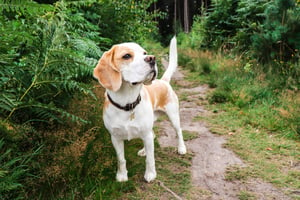Aggressive behaviour in puppies can be a source of worry for many dog owners. Fortunately, there...
Aggressive Puppy Training: How to Deal with Unwanted Behaviour
Training an aggressive puppy can be a stressful experience for pet owners. It often requires a lot of patience and dedication. In this article, we'll explore the most effective techniques for dealing with aggressive behaviour in puppies, and provide tips and advice to help ensure successful training.
Identifying Aggressive Behaviour in Puppies
Before attempting to tackle aggressive behaviour in puppies, it's important to be able to recognise it. Aggressive behaviour in puppies can manifest itself in a variety of ways, including growling, baring teeth, snapping, and biting. It's also important to note that aggression can be triggered by a variety of different stimuli, such as unfamiliar people or animals, loud noises, or being startled.
It's important to remember that aggression in puppies is a normal part of development, and should not be seen as a sign of a deeper problem. Puppies will often resort to aggressive behaviour as a way of asserting their dominance or protecting themselves. As such, it's important to be patient and understanding when dealing with aggressive behaviour in puppies.
Tips for Dealing with Aggressive Behaviour in Puppies
When it comes to dealing with aggressive behaviour in puppies, there are a few key things to keep in mind:
- Stay calm. It's important to remain calm and collected when dealing with aggressive behaviour in puppies. Losing your temper or becoming aggressive yourself can only exacerbate the problem.
- Be consistent. Consistency is key when it comes to training puppies. Establishing a routine and sticking to it can help to reduce the likelihood of aggressive behaviour.
- Provide positive reinforcement. Reinforcing positive behaviour with rewards and praise can help to reduce aggressive behaviour in puppies.
- Avoid punishment. Punishment should be avoided when dealing with aggressive behaviour in puppies, as it can actually make the problem worse.
- Seek professional help. If the problem persists, it's important to seek the advice of a professional dog trainer or behaviourist.
Socialisation and Training
Socialisation and training are two of the most important aspects of aggressive puppy training. Socialising your puppy from a young age is essential for ensuring that they are comfortable and confident around other animals and people. This can be done through exposing them to different environments and introducing them to new people and animals. Socialisation should be done gradually, and in a controlled manner.
Training is also an important part of aggressive puppy training. Teaching your puppy basic commands, such as sit, stay, and come, can help to reduce their aggression. It's also important to establish yourself as the pack leader, as this can help to prevent your puppy from becoming overly dominant.
Conclusion
Dealing with aggressive behaviour in puppies can be a difficult and stressful experience. However, by following the tips outlined above, pet owners can ensure that their puppies are trained successfully and become well-behaved members of the family.
It's important to remember that patience and understanding are key when it comes to aggressive puppy training. By remaining calm and consistent, and providing positive reinforcement, pet owners can ensure that their puppies are trained effectively and become well-adjusted members of the family.



